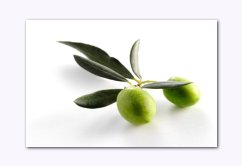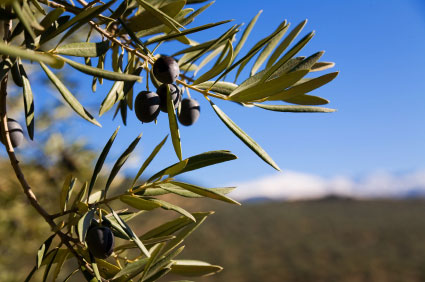Olive Leaf Extract

One of the more potent antioxidants, olive leaf extract has been shown to lower blood pressure as well as act as an antibiotic, antifungal, and anti-inflammatory. There is even some evidence that olive leaf may work as an anti-aging agent. Researchers have uncovered evidence that olive leaf may have been used as early as 3,500 B.C. by the ancient Greeks and the ancient Egyptians to treat wounds and keep them from becoming infected. Some of the most exciting research currently centers on exploring the use of olive leaf for the treatment of herpes, hepatitis, mononucleosis, and HIV. There is also some evidence that olive leaf may be useful to treat some thyroid conditions.
The Memorial Sloan-Kettering Cancer Center in New York advocates the use of olive leaf, scientific name Olea Europaea, to help patients lower cholesterol, blood pressure, and blood glucose. One study, published in the fall 2007 issue of Phytotherapy Research and conducted by researchers in Germany and Switzerland, compared pairs of identical twins with high blood pressure to gauge the effectiveness of olive leaf. Not only were the twins, one receiving 500 mg. per day and the other receiving 1,000 mg. per day, found to have reduced blood pressure, they also were found to have lower cholesterol levels, especially lower levels of the "bad," or LDL, cholesterol.
Olive leaf extract, often sold as an anti-aging formula, is found in soap, hand cream, body lotion, and shampoo, as well as sold in supplements of capsules containing dried and crushed olive leaves. Most sources agree that the dosage required to produce optimal anti-aging, cholesterol-lowering, and antihypertensive effects is 1,000 mg. per day.
 Unlike other antioxidant supplements, olive leaf does not have to be taken in more than one dose, and the entire day's allotment can be taken at one time, with breakfast being the preferred time.
Unlike other antioxidant supplements, olive leaf does not have to be taken in more than one dose, and the entire day's allotment can be taken at one time, with breakfast being the preferred time.
Users of olive leaf have not reported any side effects while taking olive leaf, and there appear to be no known toxic reactions while taking olive leaf supplements. Some experts insist that olive leaf be used carefully by individuals with documented cases of hypertension, hypotension, hypoglycemia, and/or diabetes, since the compounds present within the herb may result in unsafe, perhaps even life threatening, drops in blood pressure and blood sugar, especially when combined with other treatments for these disorders. Because little research has been conducted documenting the effects of olive leaf when used by children and women who are pregnant or nursing, the use of olive leaf by individuals in these groups should be limited.
Sources
- Olive Leaf http://www.mskcc.org/mskcc/html/69315.cfm
- Olive Leaf to Treat Hypertension? Study Shows Olive Leaf Extract Is Effective in Lowering Blood Pressure http://www.webmd.com/hypertension-high-blood-pressure/news/20080829/olive-leaf-to-treat-hypertension
- Food supplementation with an olive (Olea europaea L.) leaf extract reduces blood pressure in borderline hypertensive monozygotic twins http://www3.interscience.wiley.com/journal/121373304/abstract?CRETRY=1&SRETRY=0
- Olive Leaf http://www.drugs.com/npp/olive-leaf.html
